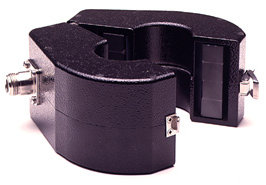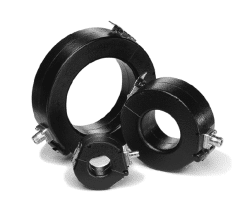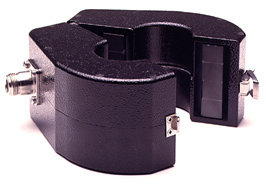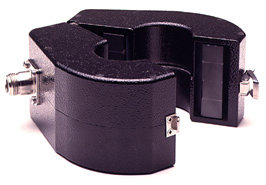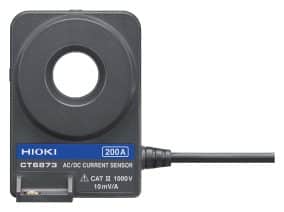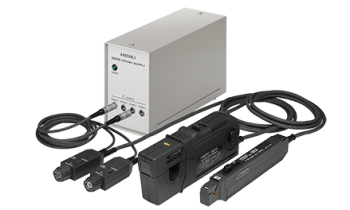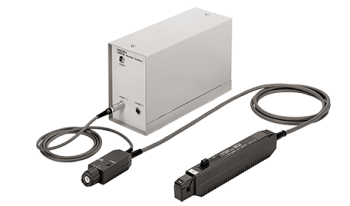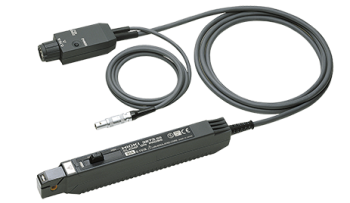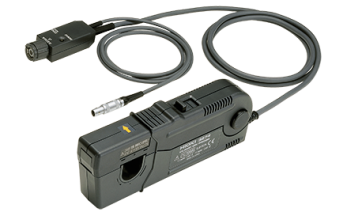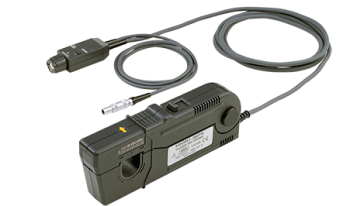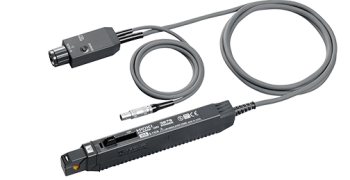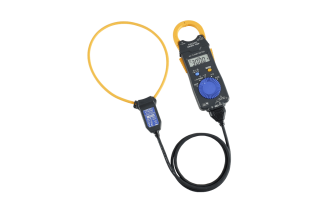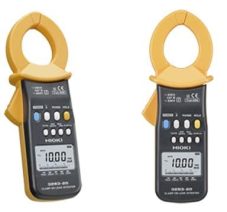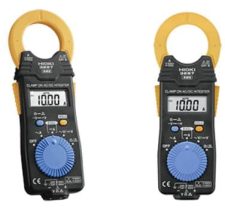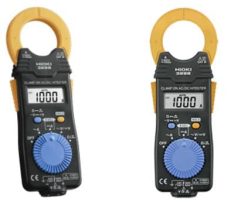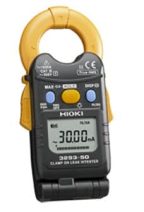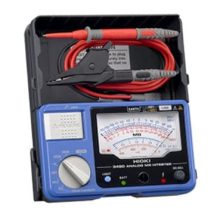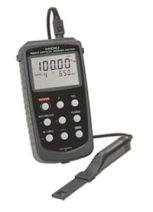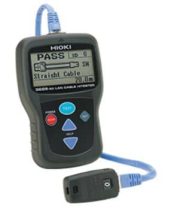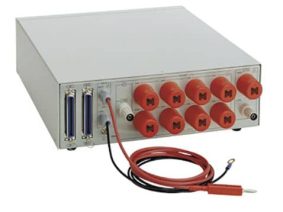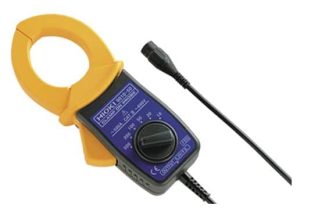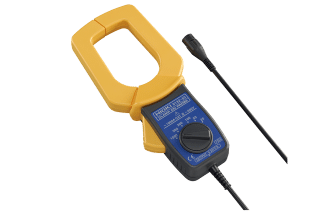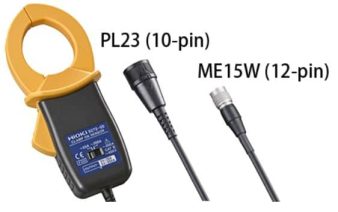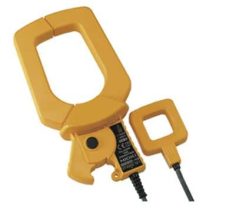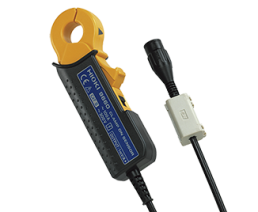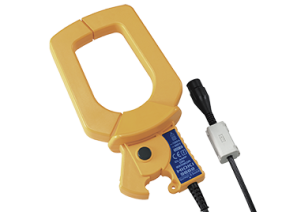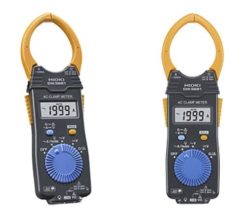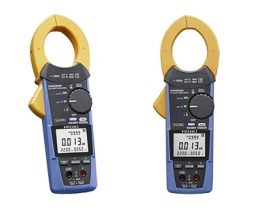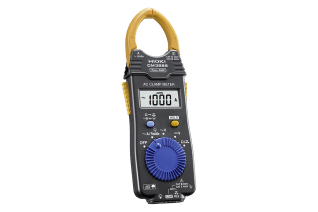Test & Measurement /
Current Probes
Current probes are devices used to measure the flow of electric current in a circuit. They work by detecting the magnetic field generated by the current and converting it into a measurable signal. Current probes come in various types and sizes, and can be used for a wide range of applications, including testing and troubleshooting electronic circuits. There are several types of current probes available, including clamp-on probes, which can be easily attached to a wire without interrupting the circuit, and Rogowski coils, which are flexible and can be wrapped around a conductor. When choosing a current probe, it’s important to consider factors such as the range of current being measured, the frequency response of the probe, and the type of connector required. Using a current probe is relatively straightforward. Simply attach the probe to the circuit being measured and connect it to an oscilloscope or other measuring device. The probe will then detect the magnetic field generated by the current and convert it into a signal that can be displayed and analyzed.
Current probes are devices used to measure the flow of electric current in a circuit. They work by detecting the magnetic field generated by the current and converting it into…
...a measurable signal. Current probes come in various types and sizes, and can be used for a wide range of applications, including testing and troubleshooting electronic circuits.
There are several types of current probes available, including clamp-on probes, which can be easily attached to a wire without interrupting the circuit, and Rogowski coils, which are flexible and can be wrapped around a conductor. When choosing a current probe, it’s important to consider factors such as the range of current being measured, the frequency response of the probe, and the type of connector required.
Using a current probe is relatively straightforward. Simply attach the probe to the circuit being measured and connect it to an oscilloscope or other measuring device. The probe will then detect the magnetic field generated by the current and convert it into a signal that can be displayed and analyzed.
-
Frequency Range: 20 Hz – 100 MHz The Model 91550-1 current probe and 91550-1L current probes are extremely broad frequency range probes covering 20...FIND OUT MORE
-
Frequency Range: 10 kHz – 30 MHz The Model 93511-1 has a constant transfer impedance of 1 Ohm from 10 kHz to 30 MHz. This user friendly feature...FIND OUT MORE
-
Frequency Range: 10 kHz – 30 MHz The Model 93686-1 probe is extremely useful when making common mode measurements as per MILSTD-1399, Section 390,...FIND OUT MORE
-
Frequency Range: 10 kHz – 200 MHz The Model 93686-Series have a variety of different sensitivities and frequency ranges. The large 2.625″...FIND OUT MORE
-
Frequency Range: 100 kHz – 450 MHz The 94106-1 probe has a 1.25″ window measurement probe covering the frequency range from 100 kHz to 450...FIND OUT MORE
-
Frequency Range: 1 MHz – 1000 MHz The 94111-Series probes have a 1.25″ window measurement probe covering the frequency range from 1 MHz to 1...FIND OUT MORE
-
Frequency Range: 10 kHz – 250 MHz The small size and light weight 94430-1 measurement probe has a 0.75″ window, covering the frequency range...FIND OUT MORE
-
Hioki’s pass-through type AC/DC current sensors can be connected directly to Hioki Power Analyzers and Memory HiCorders. Also, it can be...FIND OUT MORE
-
Hioki flat bandwidth current probes are best-in-class current sensors for use with Memory HiCorders and high performance oscilloscopes. The 3269 is a...FIND OUT MORE
-
Hioki flat bandwidth current probes are best-in-class current sensors for use with Memory HiCorders and high performance oscilloscopes. The Hioki...FIND OUT MORE
-
Hioki flat bandwidth current probes are best-in-class current sensors for use with Memory HiCorders and high performance oscilloscopes. The Hioki...FIND OUT MORE
-
Hioki flat bandwidth current probes are best-in-class current sensors for use with Memory HiCorders and high performance oscilloscopes. The Hioki...FIND OUT MORE
-
Hioki flat bandwidth current probes are best-in-class current sensors for use with Memory HiCorders and high performance oscilloscopes. The Hioki...FIND OUT MORE
-
Hioki wide frequency current probes are best-in-class current sensors for use with Memory HiCorders and high performance oscilloscopes. The Hioki...FIND OUT MORE
-
Hioki clamp meters are best-in-class measuring devices incorporating Hioki’ s expertise in current sensing technology. The Hioki 3280-10F is an...FIND OUT MORE
-
The Hioki 3283 Clamp On Leak HiTester has been discontinued. Please See Hioki CM4003 AC Leakage Clamp Meter Hioki clamp meters are best-in-class...FIND OUT MORE
-
Hioki clamp meters are best-in-class measuring devices incorporating Hioki’s expertise in current sensing technology. The Hioki 3287 is an AC/DC...FIND OUT MORE
-
Hioki clamp meters are best-in-class measuring devices incorporating Hioki’s expertise in current sensing technology. The 3288 and 3288-20 clamp...FIND OUT MORE
-
Hioki clamp meters are best-in-class measuring devices incorporating Hioki’s expertise in current sensing technology. The Hioki 3293-50 features a...FIND OUT MORE
-
Hioki insulation testers or megohmmeters feature all-in-one designs including built-in rugged cases and test lead storage compartments. The Hioki...FIND OUT MORE
-
The Hioki 36654 Optical Power Meter has been discontinued. The Hioki 3664 is an optical power meter for measuring the optical power of a spatial...FIND OUT MORE
-
The Hioki 3665 is a handheld LAN cable tester to easily test wire map, measure cable length and identify twisted-pair cables, and is useful for...FIND OUT MORE
-
The Hioki 3930 is an essential accessory for your Hioki 3153 automatic insulation/withstanding tester or sequencer. This passive auxiliary tester is...FIND OUT MORE
-
Hioki current sensors are best-in-class devices for accurately capturing a wide range of current levels. The Hioki 9010-50 is a multi-range 500A AC...FIND OUT MORE
-
Introducing the CLAMP ON PROBE 9132-50, a multi-range 1000 A AC voltage output clamp sensor designed to accurately capture waveforms with DMMs and...FIND OUT MORE
-
Introducing the CLAMP ON SENSOR 9272-05, the perfect solution for accurately measuring AC current with low frequencies, such as inverter control...FIND OUT MORE
-
The Hioki 9290-10 AC Current Transformer – the perfect solution for measuring high currents that exceed 1000A AC. With a 10:1 CT ratio and a...FIND OUT MORE
-
Introducing the Hioki 9660, the ultimate solution for measuring load current and voltage output in tight spaces! As a leading device in its class,...FIND OUT MORE
-
Introducing the CLAMP ON SENSOR 9669 from Hioki, the ultimate solution for measuring load current and voltage output with unparalleled accuracy and...FIND OUT MORE
-
Experience accurate and reliable current measurements with the AC CLAMP METER CM3281 from Hioki. Boasting a large jaw that allows you to clamp with...FIND OUT MORE
-
Hioki clamp meters are best in class handheld current and voltage meters for safely and accurately measuring power lines. The Hioki CM3286 clamp on...FIND OUT MORE
-
Hioki clamp meters are best-in-class measuring devices incorporating Hioki’ s expertise in current sensing technology. The CM3289 is a True RMS...FIND OUT MORE

